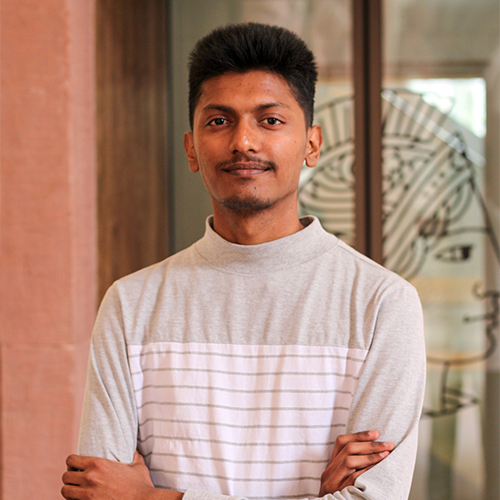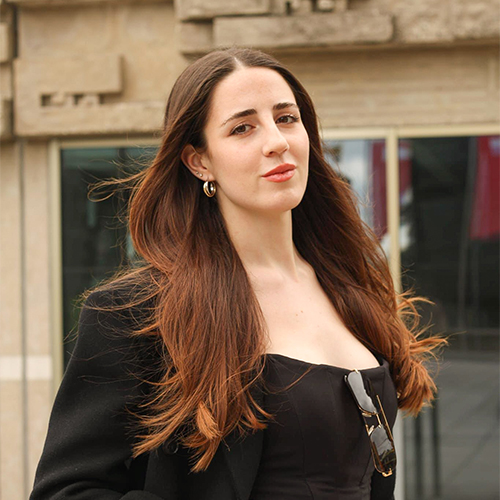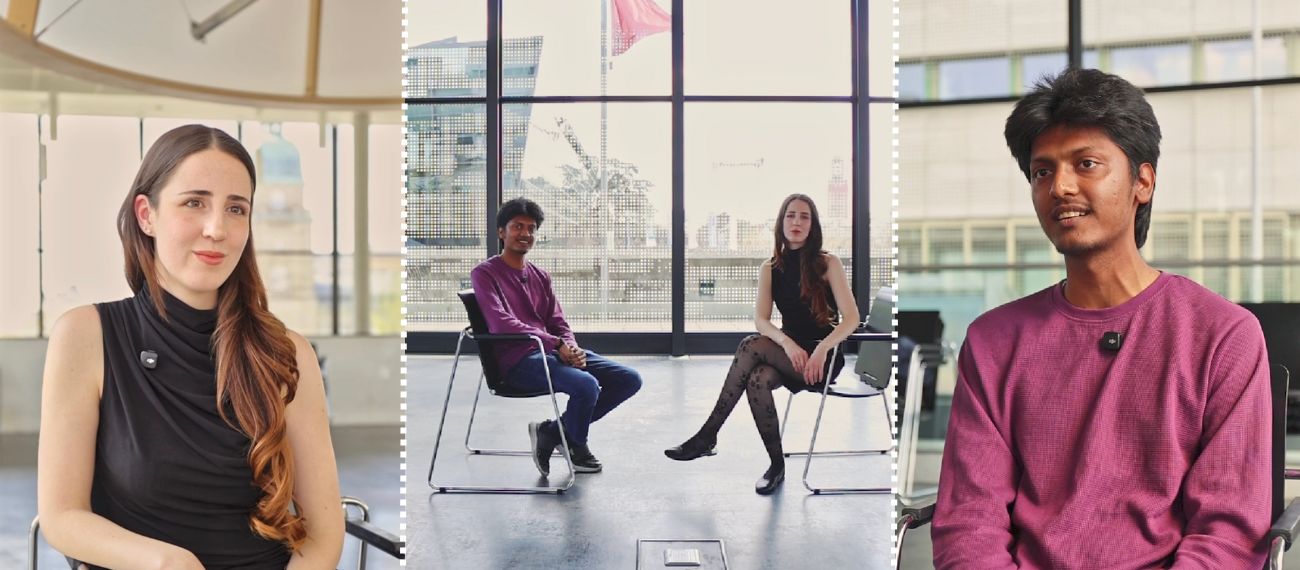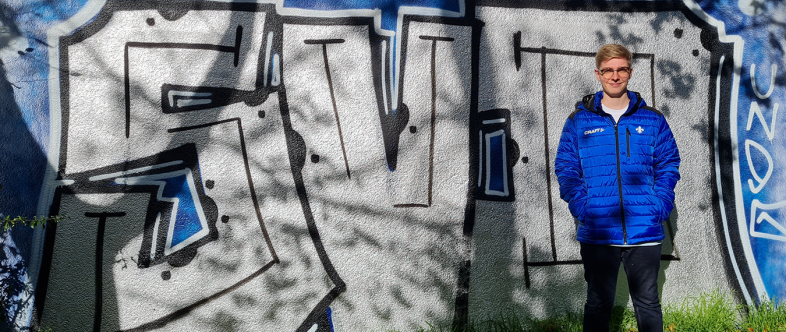Published: 30.04.2025
Student perspectives – managing expenses
Aditya and Celina provide their own experiences on managing their monthly budgets and financial strategies.
Aditya: As an international student I had to provide proof of funds by opening a blocked account for at least one year to secure my student visa. In my case, I financed this account with an education loan from back home, which amounted to 934 euros in 2023.
Once the funds in my blocked account were depleted, I took on two Hiwi positions at the university—working as an ambassador for #studentsoftudarmstadt and as a student assistant. These roles were crucial in helping me manage my finances and gain valuable work experience.
Currently, I live in a private student dorm operated by Bauverein, sharing the apartment with two other students. My rent, including utilities, comes to 480 euros per month. In addition, I pay a compulsory health insurance fee of 144 euros per month. My monthly grocery expenses are roughly 100 euros, and I typically spend another 50 euros on dining out or eating at the mensa.
In total, my monthly expenses average around 850 euros. This firsthand experience has taught me the importance of careful budgeting and financial planning while studying abroad.
Aditya,
M.Sc. Aerospace Engineering
I financed my blocked account with an education loan and then worked two HiWi jobs at the University. My monthly budget is around 850 euros.

Celina: Financing my studies is a mixture of different sources of income for me. The ‘Deutschlandstipendium’ is an enormous support, as it takes the financial pressure off me and gives me the freedom to concentrate more on my studies.
Nevertheless, I work part-time as I think it is important to gain practical experience early on. Working as a student trainee in an architecture firm not only helps me financially, but I also really enjoy it. Working as an Ambassador also allows me to meet interesting people and gain new experiences.
One important financial aspect I would like to mention is the support of my parents, who pay my semester contribution, for example. This of course gives me additional security and enables me to choose my part-time jobs consciously instead of accepting everything out of necessity.
Students studying architecture in particular face high additional costs. In addition to the semester fee of around 370 euros per semester, there are other expenses for modelling, excursions and plots, so my budget for my studies amounts to around 800 euros per semester. Many of my fellow students work part-time alongside university in order to finance their studies, which often means that they study a little longer – an option that I can certainly understand.
The cost of living also varies greatly, especially when it comes to rent. Depending on where you live and whether you live in a shared flat or alone, the rent can range from 250 euros to 700 euros – depending on location, flat size and personal requirements. I spend around 250 euros a month on food, although this naturally fluctuates depending on my life situation, the time of year or particular phases of my studies.
Overall, I have achieved a good balance. Thanks to the combination of a scholarship, work and family support, I can manage my studies without having to overburden myself financially. At the same time, I have the opportunity to gain experience that will be useful to me later on.
Celina,
M.Sc. Architecure
I’m supported by the Deutschlandstipendium, which relieves financial pressure and lets me focus on my studies, while part-time roles, both as a student trainee in an architecture firm and as a university ambassador, give me practical experience and extra income.

Scholarships and Financial aid
One of the best ways to support your studies is through scholarships. TU Darmstadt and other organizations offer a wide range of options – some based on academic achievement, others focused on social or financial need. Below is a quick overview of key scholarships, with links for more information:
Open to all students with strong academic performance and social engagement. Provides €300 per month for at least one year. Half is funded by the government, the other half by private sponsors. Also includes access to a growing network of professionals and mentoring opportunities.
Federal financial aid for students in need (mostly German and EU citizens, but some international students with long-term residency may qualify). Monthly support based on family income. 50% of the aid is a grant; the other 50% is an interest-free loan that is repaid after graduation.
A flexible student loan available to German and EU students, and in some cases non-EU students with a German degree. You can choose monthly payouts (up to €650) and repayment starts after graduation. No collateral or parental income required.
Studienstiftung des deutschen Volkes
Germany’s most prestigious scholarship foundation. Supports top-performing students with monthly stipends and access to academic seminars and a high-level alumni network. Requires a nomination (often by professors) and has a selective application process.
Full scholarships for Master’s students in STEM fields at TU Darmstadt. Covers around €750/month for two years. Requires excellent academic performance and motivation. Around 25 scholarships are awarded each year.
A DAAD scholarship for professionals from developing countries, pursuing development-related Master’s programmes in Germany. Includes a full stipend (typically €934/month), travel allowance, health insurance, and sometimes German language courses.
A broad range of scholarships for international students coming to Germany. Offers vary by region, degree level, and programme. Includes monthly stipends, travel grants, and insurance depending on the specific scholarship.
A one-time or first-semester scholarship for international students with a German school-leaving certificate (Abitur) from abroad. Aims to support a smooth start to university life at TU Darmstadt.
For international students in the final phase of their studies (Bachelor’s or Master’s). Offers financial support for up to six months to help students focus on completing their thesis without financial stress.
EU mobility programme offering monthly grants for students going abroad to a partner university in Europe. Covers travel and partial living costs. No tuition fees at the host institution.
DAAD-funded programme for short-term study or research stays outside the EU. Offers partial funding (monthly grants and/or travel allowance) for students spending a semester or internship abroad.
Supports German students studying or researching in the United States. Offers travel grants, full or partial tuition support, and living cost stipends for up to one academic year. Strong emphasis on academic merit and intercultural exchange.
Aimed at students showing outstanding leadership potential and commitment to social impact. Specific details and deadlines vary by year.
Stipendium für mehr Chancengerechtigkeit
Promotes equal opportunities by supporting students from underrepresented or disadvantaged backgrounds. Provides financial aid and mentorship.
Part-Time Jobs and Earning Money
Many students finance their studies by working part-time, either at the university or in the city. TU Darmstadt and local businesses offer a variety of student jobs that can help cover living costs while gaining work experience.
Common part-time options:
- HiWi jobs (student assistants in labs, research groups, or departments)
- Tutoring or peer mentoring
- Working at events, cafes, or admin offices
Where to find jobs:
- Stellenwerk portal: TU Darmstadt’s official job portal for student jobs and internships.
- Arbeitsagentur (Federal Employment Agency): Offers listings for mini-jobs and part-time work across Germany.
- Notice boards around campus often advertise short-term roles, gigs, or experiments you can participate in. Paid experiments in psychology, economics, or human-computer interaction studies offer a quick and easy way to earn money.
Important for non-EU students: Non-EU students need to be aware of the working regulations as instructed by their student visa.
More information on this topic can be found in our blogpost How to earn money as a student.
Student Support Services
At TU Darmstadt, you’re not alone when it comes to managing your finances or navigating life as a student. There are several support teams and organiszations dedicated to helping both international and local students with financial questions, job searches, and day-to-day challenges.
Here are the most important services to know about:
International Student Services (ISS):
The go-to support team for international students. ISS provides advice on finances, scholarships, visas, health insurance, and much more. They offer regular info sessions and one-on-one consultations to help make your start in Darmstadt as smooth as possible.
A peer mentoring programme for international students. Tutors help you settle in, understand student life, and can answer questions about budgeting, finding accommodation, or accessing university services.
This team offers support with finding scholarships, financial planning, and navigating funding opportunities. They also organisze community events, workshops, and counseling tailored to international students.
The AStA represents student interests and offers advice on housing, jobs, and financial matters. They also coordinate access to emergency aid funds for students in financial difficulty and run a wide range of student services and social activities.
Together, these services form a strong support network – whether you’re figuring out your first budget, applying for scholarships, or looking for ways to save money, there’s always someone to help.
Listen to the fuTUre Students podcast on Spotify for insights and tips from students about financing your studies with scholarships. Studienfinanzierung mit Stipendien – fuTUre students | Podcast on Spotify

Aditya
Hi, I am Aditya and I am doing my Masters in Aerospace Engineering. This course covers various disciplines in the field of Aviation and Space Travel. I really like the unique curriculum of TUDa and I get to learn from Professors who are working in agencies such as ESA, DLR, Boeing.

Celina
Hey, I'm Celina and I'm studying for a Master’s degree in architecture. As a budding architect, I want to actively shape the environment and positively influence your subconscious emotions with my visualizations. In the best-case scenario, you will recognize my architecture and think of me :)



